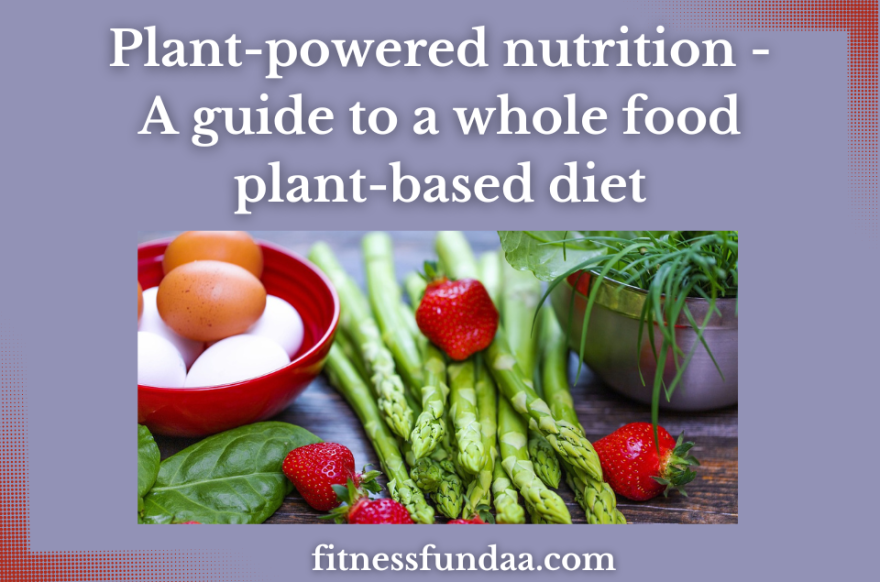A whole foods plant-based diet is centred around consuming unprocessed or minimally processed plant-derived foods, emphasizing fruits, vegetables, whole grains, legumes, nuts, and seeds. It promotes the consumption of nutrient-dense, natural foods while avoiding or minimizing processed foods, refined sugars, and animal products In this article we’ll discuss how plant-powered nutrition is beneficial for us.
Nutrient-Rich Foods:
Fruits and Vegetables: Rich in vitamins, minerals, antioxidants, and fibre, promoting overall health.
– Whole Grains: Provide complex carbohydrates, fibre, and various essential nutrients.
– Legumes: Excellent sources of plant-based protein, fibre, and essential minerals.
– Nuts and Seeds: Offer healthy fats, protein, vitamins, and minerals.
Protein Sources:
– Beans and Lentils: High in protein, fibre, and various nutrients.
– Tofu and Tempeh: Plant-based meat alternatives, rich in protein and versatile for cooking.
– Quinoa: A complete protein source containing all essential amino acids.
– Nuts and Seeds: Provide protein, healthy fats, and micronutrients
The trick to making the most of these plant-powered iron sources is to team them up with vitamin C sidekicks. Load up on citrus fruits, strawberries, and bell peppers to give your body a hand in absorbing that non-heme iron goodness. But here’s a tip: steer clear of chowing down on calcium-rich foods or sipping tea and coffee while you’re digging into your iron-packed meals. They can throw a bit of a wrench into the absorption process.
For a little extra iron boost, try cooking up some acidic dishes in trusty cast iron cookware. And if you’re feeling adventurous, dabble in sprouting and fermenting for your grains and legumes—they’re not just trendy, they can amp up that iron bioavailability.
If you’re committed to the plant-based lifestyle, keeping tabs on your iron levels and having a chat with a healthcare pro is a smart move. By weaving these practices into your dietary schedule, you’ll not only enjoy the deliciousness of plant-based iron sources but also make sure your body’s soaking up all the nutritional goodness it can get.
Health Benefits:
When a person follows a plant-based diet, it results in multifaceted development Embracing a plant-based diet emerges as a holistic strategy for diminishing the likelihood of heart disease. This dietary shift inherently restricts the intake of saturated fats and cholesterol present in animal products, thereby managing LDL cholesterol levels and preventing the onset of atherosclerosis.
The rich nutritional profile of plant-based diets, replete with fibre, antioxidants, vitamins, and minerals, lays a robust foundation for cardiovascular health. The naturally occurring balance of potassium, magnesium, and reduced sodium content in plant-based foods aids in maintaining optimal blood pressure levels
. Moreover, the anti-inflammatory attributes inherent in fruits, vegetables, and whole grains act as a shield against chronic inflammation and oxidative stress, crucial contributors to heart disease. The diet’s lower caloric density and heightened fibre content play a pivotal role in weight management, a cornerstone in mitigating risks associated with heart-related conditions.
Additionally, the potential enhancement of endothelial function and blood sugar control further underscores the comprehensive advantages of embracing a plant-centric lifestyle. While recognizing individual health nuances, seeking counsel from healthcare professionals ensures a personalized and well-rounded approach to nurturing cardiovascular well-being through dietary choices.
Choosing a plant-based diet can help in keeping your blood sugar levels in check, especially if you’re dealing with diabetes or aiming to prevent it.
Plant-based diets are loaded with fibre, found in things like fruits, veggies, and legumes. This kind of fibre slows down the absorption of glucose, helping to maintain steady blood sugar levels. Plus, there’s insoluble fibre in whole grains that keeps your digestive system happy.
Smart Carbs for the Win:
The carbs you get from whole grains, legumes, and veggies in a plant-based diet are the good kind—complex carbs. They take their sweet time to break down, releasing glucose gradually into your bloodstream and preventing those annoying blood sugar spikes.GI, the Blood Sugar Speedometer:
Many plant-based foods have a low glycaemic index, which means they have a gentle impact on your blood sugar levels. It’s like they’re on cruise control, providing a slow and steady release of glucose.
That’s the kind of ride you want for stable blood sugar. Say No to Refined Stuff: Plant-based diets naturally steer you away from processed sugars and refined carbs that can mess with your blood sugar. By skipping these quick-hitting foods, you’re helping keep your levels in a healthier range.
Insulin’s Best Friend:
Some studies hint that a plant-based diet might make your body’s insulin work better. That’s a big deal because insulin is the VIP hormone that helps regulate your blood sugar. So, better insulin sensitivity means smoother blood sugar control.
Weight Management Magic:
Keeping a healthy weight is crucial for managing blood sugar, and plant-based diets make it easier. With their focus on nutrient-packed foods and lower calorie density, they’re like a secret weapon against insulin resistance and type 2 diabetes.
Antioxidants to the Rescue:
Plant-based foods are like an army of antioxidants fighting inflammation and oxidative stress. These bad guys are linked to insulin resistance, so by bringing in the antioxidants, you’re giving your blood sugar regulation a boost.
Healthy Fats for the Win:
Plant-based diets often include good fats from sources like avocados, nuts, and seeds. These fats are like cheerleaders for your insulin sensitivity, supporting your overall metabolic health.
To sum up, adopting a whole foods plant-based diet, featuring an array of fruits, vegetables, whole grains, legumes, nuts, and seeds, brings a host of health advantages. Apart from supplying vital nutrients and antioxidants, this dietary approach exhibits the potential to balance iron levels, improve heart health, and regulate blood sugar.
The article highlights strategies for maximizing iron absorption, such as combining iron sources with vitamin C-rich foods and utilizing specific cooking methods. The positive effects extend to preventing heart disease, managing diabetes, and promoting overall health.
While embracing plant-based living, it’s recommended to seek advice from healthcare professionals for personalized guidance, ensuring a tailored and effective path to enjoying the diverse benefits of plant-focused nutrition.
FAQs Answered
Describe the role of a plant-based diet to prevent heart disease.
The role of a plant-based diet in preventing heart disease, considering aspects such as reduced intake of saturated fats, cholesterol management, and the overall impact on cardiovascular health
Which plant-based foods serve as reliable sources of protein?
The diverse protein sources within a plant-based diet, including beans, lentils, tofu, tempeh, quinoa, nuts, and seeds, and understand their significance in meeting protein and nutrient needs.
How does a plant-based diet support effective weight management?
The mechanisms by which a plant-based diet supports weight management, considering factors such as nutrient density, calorie content, and the role of complex carbohydrates and fibre in promoting satiety.
What practical tips can enhance iron absorption in a plant-based diet?
There are various practical tips and strategies for optimizing iron absorption within a plant-based diet, such as combining iron sources with vitamin C-rich foods and experimenting with cooking techniques.
Why is seeking guidance from healthcare professionals important when adopting a plant-based lifestyle?
It is quite significant to consult healthcare professionals when transitioning to a plant-based diet, considering individual health needs and ensuring a personalized and well-informed approach to plant-powered nutrition.
see also :Virtual Fitness: Embracing Technology for home workouts

